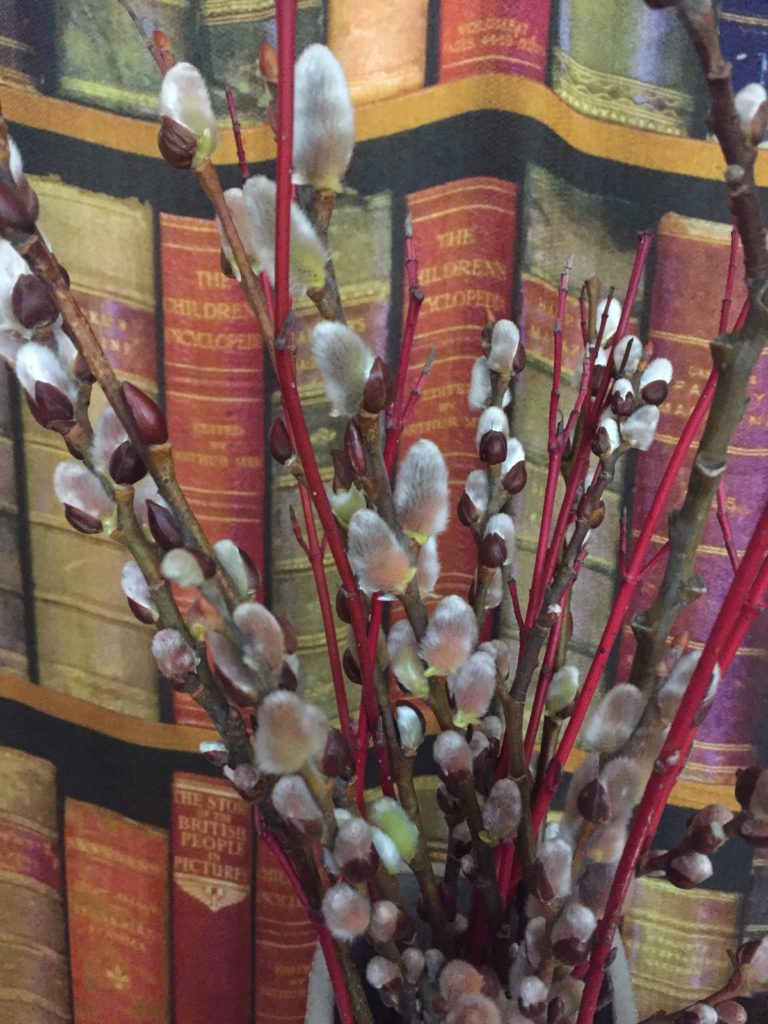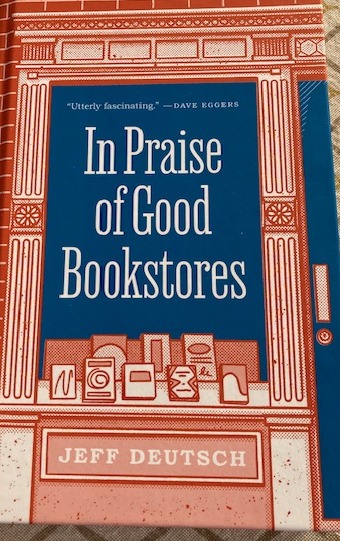
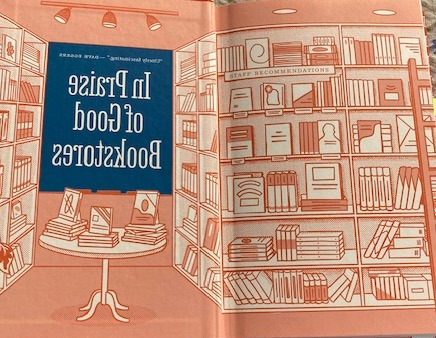
The Seminary Co-op Bookstore, born as part of the Theological Seminary at the University of Chicago, is a rare place. Founded in 1961 as a cooperative academic bookstore, rather like a food co-op, the Bookstore became a legend. For decades, it was housed in the basement of the Theological Seminary building basement. Think unassuming door, steep staircase down. No windows. Cindar block walls and low-hanging steam pipes. Winding aisles of book stacks, deliberately structure to encourage browsing, contemplation, rumination, and discovery.
In recent decades, it has been relocated and reborn. Since 1983, its (above ground) sister store, 57th Street Books, has offered the best in more general offerings, including children’s literature and other general titles such as popular fiction, cookbooks, science fiction, mysteries, and graphic novels. Now the Seminary Co-op Bookstore, too, is above ground nearby, and thriving as a pioneer–recasting the academic bookstore as a not-for-profit entity.
As with so many valuable things in my life, knowledge of this special place–and the book born from it–was given to me through the generosity of friendship. It is thanks to Bob and Julia Denne that I was able to visit this incredible bookstore some years ago, when Julia took me there on a visit. (Julia, a gifted teacher of Russian language and literature introduced me to the works of Tolstoy and Turgenev and a host of other writers. She allowed me to interview her a decade ago here.) I was able to learn more about the Bookstore from the written statement Bob made on Winona Media in 2013. A decade ago, I asked readers for suggestions of their favorite independent bookstores. Bob Denne generously wrote a section on the Seminary Co-op Bookstore. (Local readers will note that this was so long ago that Northfield then had Monkey See, Monkey Read but not our current excellent independent bookstore, Content.) And recently, Bob gave me a copy the recently published book In Praise of Good Bookstores by Jeff Deutsch, (Princeton University Press, 2022).
This book is not one to read once. It is a work of concentrated richness that illuminates the connections between all of us–readers, booksellers, librarians, writers–in a continuous and continuously unforlding community that creates a different sense of time and space. Deutsch uses the metaphors found in the works of other writers to ask us to consider the good bookstore–run by human beings rather than algorhithims–as a both a garden and a public square, a place where one finds conversation and contemplation, “fruit” (new work) and “stars” (work of enduring merit). One of the things that interested me most is the way the author describes the shift in consciousness one feels in a place dedicated to books–reminding me of the effects of the yoga studio, to being immersed in the natural world, to the shifts resulting from any kind of meditative practice. Deutsch also has well reasaoned distinctions between “value” (as a commodity) and “worth” when it comes to the art of selling books, and thoughts about the worth of rereading–an enterprise I prize more and more with passing time.
As you can tell from the marked pages of my copy, there are many riches inside, not only Deutsch’s beautiful prose but the quotes he curates from ancient and contemporary authors. This thoughtful and thought-provoking treatise is a true treat for a bibliophile. I am clearer about the ways that libraries (public, academic, and personal) overlap with good bookstores but are not at all interchangeable. As readers, we need and deserve both! (Sadly, so far the SELCO public library system does not seem to have a copy in its collection, but I was able to find two copies on the shelf of our local Content Bookstore.)
To truly understand get a sense of this book, one needs to read it for one’s self. For this post, I thought I would give a sense of how the book is structured by choosing one (only one!) small excerpt from each of its seven sections. Just a little taste….

The Presence of Books: An Introduction
“The Chicago poet Nate Marshall once said, during an event at the Co-op, that ‘the greatest thing a poet or poem can give you is permission.’ A bookstore, too, is turns out, can give you permission.”
Space
“Epicurus thought the noblest were ‘most concerned with wisdom and friendship.’ It was written upon the threshold of his school, known as the garden, ‘Stranger, here you will do well to tarry. Here our greatest good is pleasure.'”
Abundance
“Therer are virtues to book ownership as there are to communal collections, though the virtues are quite different. A patron who borrows a book is beholden to a calendar that privileges quick reads–books that both read quickly and want to be read soon. How many books must ripen on our shelves before we are ready for them? And how too might we properly digest a lush, elusive, or powerful book without marking and annotating it, and without having it at hand that we might reread bits and pieces?”
Value
“‘Without an eye to the future, regardless of current figures, the resultant enterprise will not only not only be shoddy but also economically unpromising….the fortunes and energies and spirt of the firms and the people in them will be organized and oriented to a ramshackle machine driving forward at ever greater speeds.'” (excerpted from publisher Peter Mayer’s thoughts on the state of publishing in 1978.)
Community
“When empty, the bookstore is filled with community, with our collective memory–with aspiration both communal and individual–and when full, the bookstore often maintains a quiet usually obtainable only in solitude. The arguements and enthusiasms contained in the volumes on the shelves create their own communion with the idividuals reader, while also providing a mechanism for discourse. It is a public square, no less articulate for most often being mute.”
Time
” Calvino observed that ‘in every text he writes, in any way he can, Borges manages to talk about the infinite, the uncountable, time, eternity or rather the eternal presence or cyclical nature of time.’ In his story ‘The Garden of Forking Paths,” Borges creates a suspense more suspense through his meditations on time than through his brilliant plotting of a murder.”
The Good Bookstore: An Epilogue
“Like Borges, I am a reader first, which also means I’m one of the quiet, bookish thousands who ruminate during a good browse. As much as I have written from the perspective of a career bookseller, it is as a bookstore enthusiast that I file these dispatches. I steward the Seminary Co-op because I want to live in a world with bookstores like the Seminary Co-op….These bookish landscapes built me as I built them.”
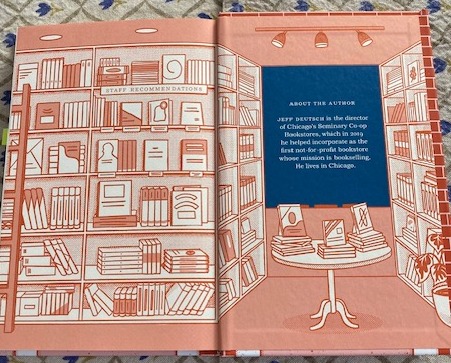
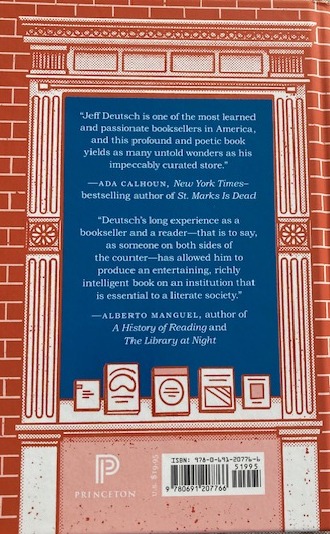
In addition to the poem composed for today, I thought of a poem I wrote last year that I wanted to share because it offers a corrollary for the mood in Deutsch’s book. It is based on a memory of a Minneapolis bookstore, since closed for good.
Not Quite Eternity Silk umbrellas rot by the door, loose-furled. I enter this bookshop on a rainy day, for a time have the whole place to myself. Even the proprietor, in the back, who surely heard the jingle of his belled door does not emerge, so it seems that I take shelter in a lonely stand of old trees. Books with faded spines mount toward the ceiling. The ceiling is pressed tin. Silvered once. Now dull as rain-laden clouds or murky fleeces on a distant hill. The light wan, soft; the air scented by almost luminous dust. Shelves make straight rows, almost a grove, with an undergrowth of haphazard piles, leaning, here and there, on the wooden floor. I reach for the word “Keats”, prise open stiff leather to find the text of letters, long since delivered of their joys and spangled sorrows, yet sharp phrases still glint when I cut these soft pages of old rag. Leslie Schultz
Context for My Poem “On Good Bookstores”:
My poem for today draws on my recent close reading of Deutsch’s excellent book, as well as something said to me by local legendary booksellar, Barbara Bonner, at the Carleton Bookstore when I first moved to Northfield and which I think of many times each week. The quote was from Cicero: “If you have a garden and a library, you have everything you need.” For the poem, I sought out the original Latin and went from there.
Once more, until tomorrow, LESLIE
